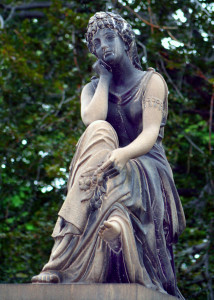Writing Process–Developing a Story Idea
by Elizabeth S. Craig, @elizabethscraig
When I spoke to students recently, they asked a lot of questions and some very good ones. Naturally, though, one of the questions, which won’t surprise any writer who talks about his writing, was ‘where do you get your ideas?’ This question is practically mandatory any time you mention writing to anyone…whether you’re speaking at a conference or telling a stranger at the grocery store what you do.
But as I thought about it, the question has another angle too, one that was asked later on by another student. How do you develop a story–a nearly three hundred page, finished book–out of a tiny spark of an idea?
Because I write genre/commercial fiction, the following will be heavily skewed toward anyone writing for a particular genre’s readers.
The genre itself: What do you enjoy reading? I read mysteries all the time and it’s what I’m most familiar with as a genre. It makes the writing a lot simpler because I know the genre’s specifications inside out. It’s also important to know, if you’re writing commercial fiction, what the readers of the genre enjoy. What’s popular in your specific genre? Amazon makes this type of research easy by ranking books by popularity by genre.
The spark: This is whatever idea was the seed for the story. For me, it’s always the murder victim, since I write mysteries. I start with the seed of the story, fleshing it out by asking what about this person would make four of five people want to get rid of her. So, for me, it’s genre-specific. What is happening in your story world to make everything change for the worse?
Characters: If this is the first book in a series for me, I keep this part fairly basic early on, so I don’t get overwhelmed. I brainstorm a protagonist, making the character as complex as possible. What makes this protagonist special or different from other characters? What skills does she have? During this process, I’m also considering flaws, and what the main character desperately cares about and fears. How could this character grow during the course of the novel as she navigates all her obstacles?
I brainstorm characters to create minor conflict for the protagonist, apart from the murderer (maybe a relative who demands a lot of the protagonist’s time and attention or who the protagonist really cares for). Or someone who stands in the protagonist’s way or doesn’t believe in her.
I develop suspects who all stand to gain in some way from the victim’s death (in your story, this might be an antagonist).
Setting: Are you writing a real setting or a fictional setting? There are pros and cons to both. If you’re writing an actual place, you’ll need to be very accurate and careful not to mention too many places that could date your book (businesses close, even successful ones). If you make your setting up, you need to make it real by mapping it out somehow so that it stays consistent. I do this by basing my made-up towns on real ones in two of my series. I just change the store names and the name of the town and get the best of both worlds. And I make notes in a story bible.
Points to consider when evaluating an idea:
How much conflict can this idea engender on its own? How could I increase that with internal conflict for the main character, antagonists, etc.?
Is this idea big enough to expound on for 75,000 words?
What sets this idea apart? What is different about it? Is it too derivative…and if it is, how can I make it unique?
My process for the very start of a book, summed up:
I come up with a murder victim and the cause of death (you’d start with whatever your story spark is). I ask who would want to murder the victim (suspects for me, characters for you). I brainstorm complex protagonists (think flaws, strengths, what the protagonist desperately cares about and fears). I think of characters (not necessarily suspects or the story’s murderer) who might be able to provide conflict for my protagonist or put her in the position where she has to make uncomfortable choices. I choose a setting. I write back cover copy (which may never be used) to sum up the story premise. Then I start my outline.
Everyone has different ways of developing an idea. What works for you?
Image: MorgueFile: Kenn W. Kiser
The post Writing Process–Developing a Story Idea appeared first on Elizabeth Spann Craig.



